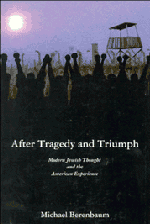Book contents
- Frontmatter
- Contents
- Foreword
- Introduction
- PART I THE HOLOCAUST IN CONTEMPORARY AMERICAN CULTURE
- PART II JEWISH THOUGHT AND MODERN HISTORY
- 8 Franz Rosenzweig and Martin Buber Reconsidered
- 9 The Problem of Pluralism in Contemporary Orthodoxy: Philosophy and Politics
- 10 From Auschwitz to Oslo: The Journey of Elie Wiesel
- 11 Jacob Neusner and the Renewal of an Ever-Dying People
- 12 Political Zionism's Would-Be Successors: Sectarianism, Messianism, Nationalism, and Secularism
- 13 The Situation of the American Jew
- Notes
- Index
13 - The Situation of the American Jew
Published online by Cambridge University Press: 06 January 2010
- Frontmatter
- Contents
- Foreword
- Introduction
- PART I THE HOLOCAUST IN CONTEMPORARY AMERICAN CULTURE
- PART II JEWISH THOUGHT AND MODERN HISTORY
- 8 Franz Rosenzweig and Martin Buber Reconsidered
- 9 The Problem of Pluralism in Contemporary Orthodoxy: Philosophy and Politics
- 10 From Auschwitz to Oslo: The Journey of Elie Wiesel
- 11 Jacob Neusner and the Renewal of an Ever-Dying People
- 12 Political Zionism's Would-Be Successors: Sectarianism, Messianism, Nationalism, and Secularism
- 13 The Situation of the American Jew
- Notes
- Index
Summary
This chapter posits that the events of the 1980s will slowly bring to an end the Israel-centered period for American Jews, leaving in its wake a spiritual and institutional vacuum. Disillusionment may create some distance between the two most significant Jewish communities in the world. Yet, more importantly, vicarious Jewish existence through identification with the State of Israel is not sufficient to nurture another generation of American Jews. Perhaps a more symbiotic relationship will emerge in the future, but in the meantime mutual disappointment may replace inflated expectations.
For the first time since emancipation, the American Jewish diaspora is free to enjoy a public Jewish life and move into the mainstream of American culture without being handicapped by its ethnicity or religious practice. Antisemitism no longer shapes Jewish consciousness or imposes Jewish identity. One can be a Jew in the street – but first one must also rediscover the content of that identity.
After tragedy and triumph, the content of Jewish identity is neither simple nor unidimensional. American Jews have a rich array of possibilities to express their identity rather than one comprehensive worldview that offers community and meaning.
July 14, 1989, was the two hundredth anniversary of the French Revolution. For Jewish history, the French Revolution represents the beginning of a two-century struggle for emancipation – that is, the achievement of equal rights for Jews within the nation state. In France, the battle for emancipation achieved unequal results. Jews became French citizens, yet even a hundred years after the revolution the Dreyfus trial demonstrated that Jews could not receive basic equality under the law.
- Type
- Chapter
- Information
- After Tragedy and TriumphEssays in Modern Jewish Thought and the American Experience, pp. 156 - 172Publisher: Cambridge University PressPrint publication year: 1990



